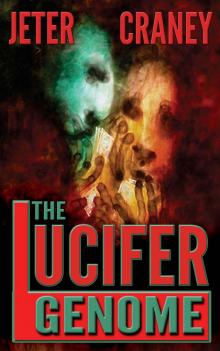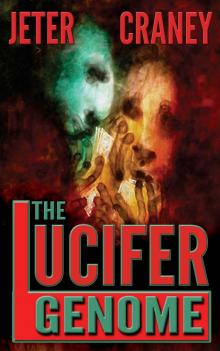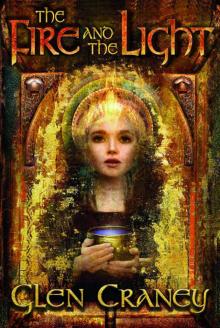- Home
- Glen Craney
The Fire and the Light
The Fire and the Light Read online
In the creation of the world, light from a central source is confronted by a return of its own vibrations. It is as though light were faced with its own echo. This confrontation produces flame. Fire appears out of light as it does in this world when the rays of the sun are concentrated through a burning glass.
- Arthur Guirdham, The Great Heresy
Contents
Foreword
Potissimus Personae
Part One
I
II
III
IV
V
VI
VII
VIII
IX
X
XI
XII
XIII
XIV
XV
XVI
Part Two
XVII
XVIII
XIX
XX
XXI
XXII
XXIII
XXIV
XXV
XXVI
XXVII
XXVIII
XXIX
XXX
Part Three
XXXI
XXXII
XXXIII
XXXIV
XXXV
XXXVI
XXXVII
XXXVIII
XXXIX
XL
XLI
Author’s Note
Additional Reading
Sources
Acknowledgments
Foreword
One night I awoke from a vivid dream of a robed priestess who walked amid the ruins of a mountain castle. The word “crusade” was chanted in my ear while the letters Mallorca flashed below the scene. Around this spectral woman’s feet sprouted dozens of crosses that shifted between possessing two and three horizontal beams. They seemed to mark the location of forgotten graves. I was struck by their resemblance to the logo used by the American Lung Association in its modern crusade against tuberculosis.
The priestess, bathed in a lucent radiance, beckoned me toward her with outstretched arms and pleaded, “Peace, child, let the Light.”
Heeding Yeats’s admonition that in dreams begin responsibilities, I hurried to the library the next morning. The medieval papacy, I discovered, had claimed possession of the triple cross for reasons that remain shrouded in mystery. According to the esoteric classic Meditations on the Tarot, one who wields this cross is empowered to regulate spiritual respiration between the angelic and earthly realms.
The double cross—also known as the Cross of Lorraine—was carried by the Knights Templar on their first journey to the Holy Land. Only decades later did those crusading monks replace it with their splayed cross pattée. Hermeticists would adopt the double cross as a symbol to denote their primal law: As above, so below. During World War II, the French Resistance embraced it as a rallying insignia in its struggle against the Nazi occupation. Today, the cross can be seen painted on walls in southwestern France as a call for the return of independence to the region once known as Occitania.
Several weeks into my research, I met Dr. Norma Lorre Goodrich, the late scholar of myth and ancient religions. In her book The Holy Grail, she identified the triple cross as a medieval watermark called the Catharist Cross. I wondered if the Vatican had confiscated this cross after exterminating the medieval Cathars, a sect of pacifist healers. The alternating number of traverse beams on the crosses in my dream suggested a connection between these doomed heretics and the recurring struggle for freedom in France. Although raised a Roman Catholic, I had never been told of the war of genocide sanctioned by the Church during the Albigensian Crusade. Yet as my investigation into these mystics deepened, I could not shake the conviction that the mysterious woman who appeared to me that night brought a warning for our own time, plagued as it is by religious intolerance and terror.
Months later, I was climbing the heights of Montsegur in the Ariege region of France. That desolate mount and its haunting castle ruins looked strikingly similar to the landscape in my vision. This discovery would prove to be only the first of many déjà vu experiences that I would have in Cathar country.
This novel is the result of my years-long quest to unveil the identity and message of the Priestess of Light who chose me to tell her story.
Potissimus Personae
Alice de Montmorency, wife of Simon Montfort.
Arnaud Almaric, Cistercian General and the Abbot of Citeaux.
Bernard d’Alion, Occitan vassal of Raymond of Perella.
Blanche de Castile, Queen Mother of Louis, King of France.
Cecille de Foix, mother of Esclarmonde of Foix.
Corba de Lanta, daughter of the Marquessa of Lanta.
Dominic Guzman, a preaching monk from Castile.
Esclarmonde de Foix, sister of the Count of Foix.
Esclarmonde Chandelle, daughter of Corba and Raymond of Perella.
Esclarmonde Loupe, daughter of Phillipa and Roger of Foix.
Folques de Marseille, an Occitan troubadour.
Giraude de Lavaur, a Cathar perfecta.
Guilbert de Castres, a Cathar bishop.
Guilhelm Montanhagol, a Knight Templar.
Innocent III, Lothario Conti, an Italian pontiff.
Jourdaine L’Isle, a Gascon knight.
Marquessa de Lanta, godmother of Esclarmonde of Foix.
Otto L’Isle, son of Esclarmonde of Foix and Jourdaine L’Isle.
Peter d’Aragon, King of Aragon.
Pierre-Roger de Mirepoix, an Occitan knight.
Phillipa d’Albi, a Cathar perfecta.
Raymond de Perella, vassal of the Count of Foix.
Raymond VI, Count of Toulouse, the suzerain of Toulousia.
Raymond VII, son of Raymond VI.
Roger de Foix, Count of Foix and Esclarmonde’s older brother.
Roger Trencavel, Viscount of Carcassonne and Beziers.
Simon de Montfort, a Norman knight.
William Arnaud, a Dominican inquisitor.
Part One
The Courts of Love
1194-1206 AD
Real changes in human sentiment are very rare—there are perhaps three or four on record—but I believe that they occur, and that this is one of them.
- C.S. Lewis, The Allegory of Love
Blessed is he who stands at the beginning. That one will know the end ...
- The Gospel of Thomas
I
County of Foix, Occitania
April 1194
To be in love is to reach for Heaven through my lady.
Lounging deshabille on her bed, Esclarmonde de Foix whispered those scandalous words again. The troubadour’s flirtations in the sitting niche had been harmless enough, but his singing of such verses to her in the square, only steps from the church, placed both their souls in jeopardy. The parish priest usually paid scant attention to wandering singers, dismissing them as a notch above half-wits and barking dogs. Yet Folques de Marseille was no common minstrel. If reports of his latest chanson reached Toulouse, the bishop might construe it as a declaration that she, not the Almighty, would lead the bard to eternal salvation. Still, to be courted by the most celebrated—
“Again you’re not listening to me!” screeched Corba de Lanta.
Flipped pages fanned a rude breeze under Esclarmonde’s nose. She snatched the codex from her irksome friend and thumbed through its myriad prescriptions for love compiled by Andreas Capellanus, a lecherous old cleric who clearly knew nothing about women. She recited the next maxim to be memorized from the De Arte Honeste Amandi: “Thou shalt not indulge in gossip of love affairs.” She flung it to the floor in exasperation. “What amusement is left us? We might nigh well enter a nunnery and take vows of silence!”
Horrified, Corba ran to rescue the precious tome, the only one of its kind in Foix, copied on linen palimpsest and stitched between leathered boards. “If you keep complaining, we’ll never learn them all in time!” She forced the book back into Esclarmonde’s hands and returned to the maddening task of adjusting a barrette in her unruly red hair. After several attempts, she gave up in tears. “We’re to be judged in two hours! How can you be so calm?”
“You fret enough for both of us.” Esclarmonde soothed Corba by fixing her friend’s mussed bangs. In truth, Esclarmonde was more anxious than her feigned nonchalance revealed. After turning twelve, she and Corba had been required to focus their scattered attentions on a year-long study of Romance and its dizzying maze of protocols. Now their long-awaited day—the most important in the life of an Occitan lady—had finally arrived. Foix’s fabled court of love would convene that afternoon to determine if they had attained the refinement necessary for admission. Corba’s mother, the Marquessa de Lanta, would preside, and their training had been in accord with the matriarch’s first commandment: If a gentleman is expected to expose his heart on the ramparts of Eros, he is entitled to the assurance that the combat will be waged under the Code of Courtesy and its duly promulgated precedents.
Esclarmonde could not fathom why an emotion so natural as love required education and litigation to flourish. Unlike Corba, she drew courtiers with ease, having inherited her father’s fiery Catalan temperament and her mother’s luscious sable hair, dark Levantine features, and lithesome grace. So striking were her luminous agate eyes that a spice merchant from Outremer once christened them the Jewels of Kaaba, marveling how they reflected the sun like the polished celestial cube said to mark the center of creation for the infidels.
The Marquessa always nullified such protests to the study with a warning that love becomes more complicated as one grows older. Its dispassionate analysis, the grande dame insisted, was as essential as theology and rhetoric: Knights carried their blades, troubadours their verses, and ladies their maxims. None should travel the world unarmed.
Esclarmonde emerged from the wardrobe wearing her favorite kirtle, an emerald damask woven with gold thread and lined with slashes at the hem. She cinched its waist with an opal-studded belt to reveal her budding figure.
Corba was aghast. “Your brother will never allow that!”
Esclarmonde struck a seductive pose. “It’s the new fashion. The Saracen courtesans girdle their seraglio raiments to draw their master’s eye.”
“How would you know?”
“I heard it in a song.”
“From that Marseilles troubadour again? He follows you like a stray cat!”
Esclarmonde twirled to test the silk’s sway. Although she’d relish Corba’s reaction, she dared not divulge Folques’s latest tribute. “Mayhaps I heard it from a knight in Mirepoix who croaks like a frog.”
“Lord Perella? You saw him? Tell me!” Only then did Corba register the slander of the man she loved from afar. “And he does not croak!”
Esclarmonde cocked her head in affected rumination. “So many men seek my attention. Impossible to keep them straight.” Suddenly, she bounced with excitement. “I do remember!” When Corba came rushing up, Esclarmonde pushed the page in question under her friend’s nose. “Rule Forty-eight. A lady shall not engage in gossip of love affairs.” She danced off with a lording smirk.
Corba reddened in anger. “I can’t wait until Mother interrogates you!”
“Folques will love me even if I fail the examination.”
Corba sighed as she curled up in a ball on the bed. “No one has ever sung to me.” Ruddy in complexion, freckled, and a bit awkward, she was always being eclipsed by Esclarmonde’s radiance. Her hips and calves tended toward plumpness and her lips, the shade of plums, were in constant flux, pursing and smacking in betrayal of every feeling. Her intellect could be charitably described as deliberate, mirroring the languid pace of her movements and mannerisms. By her own admission, she was no match for Esclarmonde’s ripostes.
Despite such perceived faults, Esclarmonde secretly envied Corba’s innocence and pureness of heart; her own lacerating wit and mordant tongue often erected unintended barriers to genuine affection. Regretting her cruel quip, she smothered Corba with a hug. “Raymond offers more in virtue and steadfastness than any lady could—” Her nose wrinkled from a whiff of cassia.
Before the girls could alter their diversion, Corba’s mother invaded the room a step behind the vanguard of her Genoese perfume. “Continue to dally and you will both end up emptying chamber pots for the Benedictines at Fabas!” The Marquessa examined Esclarmonde’s choice of attire with her usual endearing scowl. “Have I not told you that connoisseurs of fine wine distrust a fancied bottle? Now quickly, prepare yourselves!”
“Tardiness is an arrow in Cupid’s quiver,” reminded Esclarmonde. “Those were your very words when—”
The regal doyenne of the chateau was already off to attend to the hundreds of details that had established her reputation as the wisest arbiter of Courtesy in Occitania. She might have become a queen had the right eyes met hers in one of the many courts she had attended as a maiden. Instead, she fell in love with a Scots knight on his way to the Holy Land. He had stayed long enough to wed and give her Corba, then had revived his sacred mission, never to be heard from again. The Marquessa’s broad shoulders and flaxen hair came from her Iberian forbears who had inhabited the Pyrenees long before the Romans arrived. Her innate air of authority gave credence to the legend that those mercurial, fiercely independent Fuxeens—the name given to the ancient natives of Foix—were once ruled by women. She had raised Esclarmonde and her brother, sixteen-year-old Roger, after their mother died in childbirth. Ten years later, Esclarmonde’s father, Count Bernard-Roger, had been killed in a hunting mishap.
The loss of both parents at such a young age filled Esclarmonde with an insatiable desire to learn more of her family’s glorious past. The Marquessa was one of the few who could remember when the troubadours had first arrived in Foix. She said that the goddess Venus, desiring a more potent argot for the casting of her spells, invented their Occitan tongue—called Provencal by foreigners—from an alchemy of Latin, Catalan, and Arabic. Set to flight by the dulcet dialect, so many poets began expounding on love’s conundrums that people became hopelessly confused. Having been the subject of many a competing verse herself, the Marquessa had decreed the creation of an orderly system to resolve disputes of the heart without resort to violence. After all, as she was wont to prophesy, this was the dawning of the thirteenth century, a new age when ladies were to be heralded as the true guardians of haute wisdom and culture.
The two girls hurried down the tower stairwell and made their way along the battlements. The attendees were already queuing up at the garlanded entrance to the great hall. Esclarmonde lingered at the crenelations to take in the color-splashed tapestry and listen to the musicians tune their rebecs. The first blooms of the pink oleander had opened with fragrant fanfare along the conflux of the Ariege and Arget rivers, which wedged the lower town like a pair of St. Blaise’s candles at the throat. Their currents raged from the spring melting of the snowcaps. On the lush banks, the high-booted orpailleurs sifted their trough chutes in search of gold dust.
Esclarmonde’s father had often held her aloft on these vine-trellised walls, telling of Visigoth battles fought in the bracken-choked elbows of the surrounding peaks. She could twirl in any direction and face lands strikingly different in people and custom. From the west, across Aragon and Catalonia, had marched Hannibal and his man-crushing African elephants. North, beyond Aquitaine, sat Paris and its dour Franks, as foreign to her as Greeks. The Languedoc’s verdant vineyards and arid limestone plateaus were spread out toward the northeast. On clear days, she conjured up hazy images of Saracen sails entering Perpignan on the Mediterranean. Her home stood at a crossroads of many worlds, a launching point for knights and holy men on their way to gain glory and God. Eyes c
losed, she leaned over the parapet and exclaimed, “Isn’t it breathtaking?”
“Indeed, I may expire from such rarefied beauty.”
She turned with a start—her hand had been taken captive by the Marseille troubadour. Corba had rushed on into the hall without her.
Esclarmonde’s neck tingled from Folques’s mint-tinctured breath. Everything about the bard was as sharp as a serpent’s strike. His penetrating copper eyes hovered like fangs and a pointed beard punctuated his words with manic flourishes. Lacquered black locks danced above his two thin lines of brows, enhanced with a mummer’s pencil. He was forever in agitated motion, leaving the impression that he had been gifted with more brilliance than his slight body could contain. As if his poet’s effusive nature were not outlandish enough, he had designed the coral reds and jonquil yellows of his garish tabard to test the limits of the local sumptuary laws. He descended to a knee and, lifting his gaudy gaze like a saint’s to Heaven, said with a wistful sigh, “Sweet look of love encouraged.”
Esclarmonde’s mind went blank until—say nothing—she remembered one of the maxims. Silence is the kindling of passion.
Folques resisted her half-hearted attempt to pull away. “My lady continues to leave me without means of navigation. Pray advise, am I off course?”
She cast her gaze down—a tactic said to be potent in stoking a gentleman’s interest—and took the opportunity to admire his maroon buskins stitched with the finest Cordwain leather. Her discreet inquiries had confirmed the rumors: Folques had left his father’s shipping business at the age of twenty and was paid handsomely for his poesy by barons from Italy to Ireland. Although not of high pedigree, he counted both England’s King Richard and Count Raymond de Toulouse as drinking friends. There were also whispers of an abandoned wife and child, but she dismissed these as slanders propagated by jealous rivals. A natural cynosure of the fair sex, he traveled with a host of musicians and doggerel scratchers, who roamed from court to court with him seeking some explanation for their existence. Drawn like pigeons to a crust, his fawning entourage rushed up in the hope of hearing some new inspiration from his lips.

 The Lucifer Genome
The Lucifer Genome The Twelfth Tribulation: A Short Story of the American Civil War
The Twelfth Tribulation: A Short Story of the American Civil War The Lucifer Genome: A Conspiracy Thriller
The Lucifer Genome: A Conspiracy Thriller The Spider and the Stone: A Novel of Scotland's Black Douglas
The Spider and the Stone: A Novel of Scotland's Black Douglas The Fire and the Light
The Fire and the Light The Twelfth Tribulation
The Twelfth Tribulation